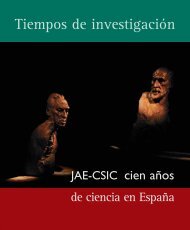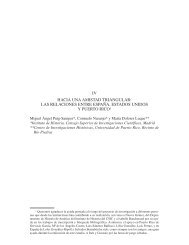primeras - JAE - Consejo Superior de Investigaciones Científicas
primeras - JAE - Consejo Superior de Investigaciones Científicas
primeras - JAE - Consejo Superior de Investigaciones Científicas
You also want an ePaper? Increase the reach of your titles
YUMPU automatically turns print PDFs into web optimized ePapers that Google loves.
FEDERICO DE ONÍS ENTRE ESPAÑA Y ESTADOS UNICOS (1920-1940) 259<br />
y <strong>de</strong>l Centro <strong>de</strong> Estudios Históricos con la Universidad <strong>de</strong> Puerto Rico: « Siento mucho<br />
verme en la imposibilidad <strong>de</strong> continuar una labor en la que he puesto todo el entusiasmo<br />
y la fe que logró <strong>de</strong>spertar en mí la juventud puertorriqueña, a la cual continuaré<br />
sirviendo <strong>de</strong>s<strong>de</strong> aquí [Columbia University] en la forma que pueda» 32. No<br />
<strong>de</strong>be pasar inadvertida la negativa por parte <strong>de</strong> las autorida<strong>de</strong>s <strong>de</strong> la Universidad, antes<br />
<strong>de</strong> 1926, a invitar al entonces catedrático <strong>de</strong> la Universidad <strong>de</strong> Granada, Fernando<br />
<strong>de</strong> los Ríos, por pertenecer éste al Partido Socialista. Onís, en una carta <strong>de</strong>l 11 <strong>de</strong><br />
septiembre <strong>de</strong> 1926, al presi<strong>de</strong>nte <strong>de</strong> la Universidad Dr. Benner, le solicita su ayuda<br />
para volver a gestionar esta invitación:<br />
Dr. Fernando <strong>de</strong> los Ríos, professor of University of Granada, has just come to this<br />
country as a <strong>de</strong>legate to the Congress of Philosophy to be held in Boston next week.<br />
He will give lectures at several American universities, and in November will leave for<br />
Mexico, where he is to inaugurate the Sociedad Cultural Española ... It has, however,<br />
seemed to me that perhaps the University of Porto Rico could take advantage of the<br />
proximity of Dr. <strong>de</strong> los Ríos to invite him there for the second semester. If this could<br />
be arranged it would mean a great <strong>de</strong>al to the University. Fernando <strong>de</strong> los Ríos<br />
possesses in an unusual <strong>de</strong>greee the best qualities of the Spanish gentleman, and he<br />
would make an excellent impression on everybody. Although his chair if of Political<br />
Science, he has specialized in the political history of Spain and Spanish-America, and<br />
nobody could give a better course than he in the history of Spanish civilization. Like<br />
his distinguished uncle, D. Francisco Giner <strong>de</strong> los Ríos, he has always been keenly<br />
interested in pedagogical questions, and he has ma<strong>de</strong> especial studies of tem in England<br />
and Germany.<br />
Several years ago the Centro and I recommen<strong>de</strong>d Dr. <strong>de</strong> los Ríos for Porto Rico, and it<br />
seems that his name was rejected on the ground that he was a Socialist congressman.<br />
This was a mistake in judgement: for a Socialist in Spain is very different from being<br />
one in the United States, and besi<strong>de</strong>s Dr. <strong>de</strong> los Ríos is a gentleman of such tact and<br />
mental superiority that it is out of the question to think that his work in Porto Rico could<br />
take on the slightest political tinge. 33<br />
32 AFO, Sección Noticias y Activida<strong>de</strong>s, cartapacio núm. 12B, 1929-1930.<br />
33 Sobre este asunto véase también la carta <strong>de</strong> Onís a Benner <strong>de</strong>l 11 <strong>de</strong> septiembre, 1926, cartapacio<br />
núm. 7B, Sección Noticias y Activida<strong>de</strong>s, AFO. Fernando <strong>de</strong> los Ríos fue invitado por la Universidad<br />
en 1928, 1929, 1939 y 1942.<br />
Hay que recordar que en Estados Unidos, en aquella y otras épocas ha existido cierta <strong>de</strong>sconfianza<br />
hacia quienes, <strong>de</strong> alguna forma, se han i<strong>de</strong>ntificado con el socialismo en sus diversas interpretaciones.<br />
Fe<strong>de</strong>rico <strong>de</strong> Onís era un hombre liberal y simpatizante <strong>de</strong> la República; los profesores españoles invitados<br />
a Puerto Rico y los Estados Unidos –personas con excelentes cre<strong>de</strong>nciales académicas– también<br />
estaban <strong>de</strong>l lado republicano, y entonces la política isleña seguía las pautas <strong>de</strong> la metrópoli. Me inclino<br />
a pensar que la invitación a Salvador <strong>de</strong> Madariaga –véase cartapacio núm. 12B, ya citado– <strong>de</strong>bió <strong>de</strong><br />
ser objeto <strong>de</strong> censura por parte <strong>de</strong> la administración universitaria puertorriqueña; habría que esperar<br />
otro tiempo para que en los Estados Unidos se entendiera en toda su amplitud lo que era el socialismo,<br />
el republicanismo e incluso el liberalismo <strong>de</strong> posguerra española. Años más tar<strong>de</strong> La Universidad <strong>de</strong><br />
Puerto Rico y su entonces rector, Lcdo. Jaime Benítez, abriría sus puertas al exilio español, como bien<br />
se pudo constatar en el Congreso «Cincuenta años <strong>de</strong>l exilio español en Puerto Rico y el Caribe 1939-<br />
1989», celebrado en la Universidad, Recinto <strong>de</strong> Río Piedras, sobre esto véase Cincuenta años <strong>de</strong> exilio<br />
español en Puerto Rico y el Caribe 1939-1989, editora Charo Portela Yáñez, Sada, A Coruña, Ediciós<br />
do Castro, 1991.




